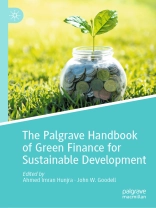This book covers green finance with a focus on the environmental, social, and governance (ESG) consequences of green financing and its role in attaining sustainable development and a carbon-neutral economy. It provides research-based practical solutions for sustainable development, as well as insights from green finance, presenting a framework for studying green finance in the domains of accounting, banking, investing, and insurance. Of interest to academics, investors, and policymakers in green finance and development and alternative financing, the book features a global cast of contributors from both academia and practice.
Inhoudsopgave
Part 1. The Theorethical Contest of Green Finance.- Chapter 1: Green Finance: Theoretical Foundation.- Chapter 2: The Theoretical Perspective of Green Finance.- Chapter 3: Understanding the Theoretical Context of Green Finance.- Chapter 4: Analysis of Stakeholders Interests in Green Finance.- PART II. Current Issues in Green Finance.- Chapter 5: Green Finance and Climate Challenges: Paving the Way for Economic, Social, and Governance Readiness and Sustainable Development Goals.- Chapter 6: Climate Disasters and Sustainability Challenges: A Way Forward in Industry 4.0.- Chapter 7: Nurturing Sustainable Futures: Islamic Green Finance and the Sustainable Development Agenda.- Chapter 8: Exploring Sustainability Reporting and Non-Financial Reporting in Green Finance: A Literature Review.- Chapter 9: Green Entrepreneurship Craving for the Green Finance.- Chapter 10: Role of Corporate Governance and Green Process Innovation towards Firm Financial Performance.- Chapter 11: Green Financing and Its Role in Shaping Economic Investment: An Alternative Perspective.- Chapter 12: ESG Ratings: An Evaluation and Discussion.- Chapter 13: ESG Disclosures and Market Price: The Moderating Role of Firm Size and Industry Sensitivity (maybe better in current issue?).- Part III. Green Finance by Sector.- Chapter 14: Effects of Institutional Environment on Green Investment in the Automotive Sector.- Chapter 15: The Sustainable Development Goals disclosure toward legitimacy: Evidence from Airlines in light of COVID-19.- Part IV. Green Finance by Regions.-Chapter 16: How does Corporate Environmental Performance Impact the Stock Performance of Finnish Firms? Implications for Sustainability.- Chapter 17: Carbon Finance in Malaysia: An Analysis of Issues and Challenges.- Chapter 18: The Road to Carbon Neutrality: How Does Green Finance Clustering Affect Total Factor Carbon Productivity in China.- Chapter 19: Financing of Energy Sector- A Case of Green Energy in Pakistan.- Chapter 20: Green Deposit Framework: Financing a Sustainable Future in India.- Chapter 21: Examining the Relationship between Climate Risk, Economic Policy Uncertainty, and Credit Risk: Evidence from MENA Banks towards Sustainable Economic Development.- Chapter 22: Driving Corporate Sustainable Development: Assessing the Influence of ESG Disclosures on Sustainable Growth – Insights from Chinese A-Share Listed Firms.- Chapter 23: How does green innovation mitigate carbon emissions in agricultural sector? Exploring a way out of sustainable agriculture in China.- Part V. Green Finance in Action.- Chapter 24: Sustainability and Green Finance and its Relevance to Debt for Nature Swap Financing.- Chapter 25: Challenges in Green Banking.- Chapter 26: Do Uncertainty Indicators Affect the Volatility of Green Bonds?.- Chapter 27: Exploring the Dynamics of Green Banking and Finance: A Literature Review.- Chapter 28: Dependence Structure between Green Bonds Market and Clean Energy Market: Evidence from Copula Approach.- Part VI. The Future of Green Finance.-Chapter 29: Green Finance: Tackling Sustainability Challenges in Today’s Economy.- Chapter 30: Sustainable Finance and Ecological Awareness for Environmental Sustainability: Enduring Challenges and Future Opportunities.- Chapter 31: Sustainable Development Goals and Future Research Areas: A Literature Review.- Chapter 32: Artificial Intelligence (AI) and Green Finance.- Chapter 33: Insights from Artificial Intelligence and Green Finance: A Bibliometric Analysis.
Over de auteur
Ahmed Imran Hunjra has more than fifteen years of teaching and research experience across various international universities. He is currently working in the domains of corporate finance, corporate governance, and sustainability. He has published in top ranked journals. He also sits on the Editorial Board of several ABS & ABDC indexed journals. He won several research awards, including ‘Best Researcher Award-2023 & 2020’ from Rabat Business School, Morocco, and PMAS-Arid Agriculture University Rawalpindi, Pakistan, respectively, “Outstanding Reviewer Award-2021 & 2023” by Emerald Literati, “Best Paper Award-2022 & 2023” by ICAI, among others.
John W. Goodell is Professor at the College of Business of The University of Akron, USA. His research interests focus on the impact on financial systems of national culture and institutions. In 2011, he received the Stockholm School of Economics/Women in the Academy of International Business Award for Increased Gender Awareness in International Business Research. His research has been highlighted in numerous media outlets including the Washington Post, PBS News Hour, and Bloomberg Businessweek. Having co-authored over 200 articles, he is currently Editor-in-Chief of Elsevier’s Research in International Business and Finance and is frequently invited to speak at international events.












